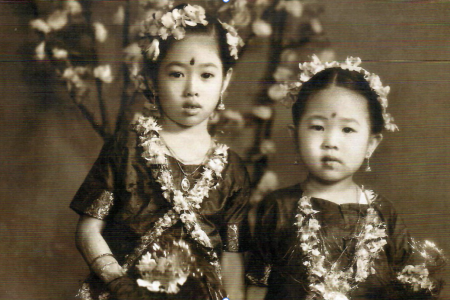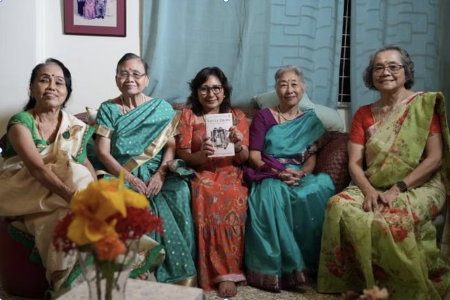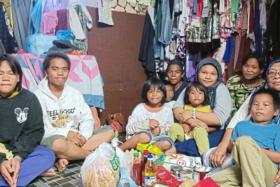'Suay' to one family, 'pakiam' to another
When Jane Devasahayam was born 86 years ago to Chinese parents, she was considered "suay" (unlucky) as her mother had died during childbirth. Her father, a farmer in Johor Bahru, gave her away to an Indian family shortly after.
“The day I arrived at my new family’s home, my adopted father won the lottery,” Madam Jane told tabla!
“So I also grew up with the nickname Pakiam, which means good fortune in Tamil.”
Inspired by the anecdote and the tales of other Chinese children who were adopted and raised by Indian parents in Singapore pre-1960s, Madam Jane’s daughter, sociologist Theresa Devasahayam, embarked on a trail to document the lived experiences of 14 such women.
Her book, entitled Little Drops: Cherished Children Of Singapore’s Past, was published on Feb 20, and documents anecdotes on Singapore’s history with cross-cultural adoption.
Though she said it’s difficult to ascertain how many such adoptions took place between the 1930s and 1960s, Dr Theresa estimated the number to be in the thousands.
“I wanted to pass on these lived experiences to the younger generation, many of whom may not know that this phenomenon of cross-cultural adoption had once been relatively common in Singapore,” she said.
Madam Jane shared some of the challenges she faced growing up, such as when she would ask her adoptive mother of her origin.
“I asked her, ‘how come I am so fair-skinned?’ My mother would jokingly reply that it was because I fell into a tub of milk,” she reminisced with a laugh.
Madam Jane never picked up the Chinese language. In school, she learnt English and Malay, and even Latin. She learnt to speak Tamil on her own.
When she was a young adult, her mother eventually told her the truth about her adoption. She then tried to seek out her birth family – but her efforts were unsuccessful. Despite that, she looks back on her life with gratitude towards her adoptive parents.
Madam Saraswathi Nagalingam, also documented in the book, learnt of her true origins when she was 12.
The 75-year-old’s foster parents were originally from India and settled in Singapore during the 1940s.
“I do not know exactly at which age I was given away,” Madam Saraswathi said. “But I did see photographs of myself aged possibly two or three, with my adoptive parents, so I am guessing that I was adopted before that”.
She remembers that although she was not treated any differently at school, there were some students who used to insist she was Chinese, which would make her cry.
“I used to dislike how I looked. To comfort me, my mother would tell me that my skin would eventually be like hers as I grew older,” she said.
As a form of protection, her mother made her wear a pottu (little black dot) on her forehead during the 1964 race riot between the Chinese and Malays.
“This proved tricky, as I was attending a Methodist school, which at the time, discouraged Indian students from wearing the pottu. Once I removed the pottu and my mother found out. She was so upset with me that I never dared again to remove it. From that day, I realised the extent of her love for me,” Madam Sarawathi said.
She also recalled a Chinese woman who used to turn up at her house occasionally when she was a child – only to be shooed away by her parents. She inferred that the woman was her birth mother, but never dared to ask her foster mum about it. When she turned 12, she discovered she was Chinese by birth from her birth certificate.
“My adoptive mother insisted there was a mistake in the birth certificate. I was old enough to know the truth, but I loved her too much to ever bring the matter up again,” she said.
Years later, when she was married, her husband once suggested she put an advertisement in the Chinese newspapers to locate her birth family.
“I told him, you find that out if you want, but I am not interested. As far as I am concerned, I already have a family of my own,” she said.
stateless
Growing up in the kampung of Aljunied, Madam Thangah Koh was treated as an Indian in school and by her neighbours, who were predominantly Malay.
The 72-year-old, whose foster father was a kacang putih seller, recalled the time she was left confused after being refused a pink identification card (IC).
Instead, at the age of 14, she was given a blue IC, and told by a government official that she was Chinese.
“The officer asked me if I was Chinese. I said, no! But he insisted that I was, showing my original Chinese name in my birth certificate. It was only then that I noticed my Chinese name for the first time,” Madam Thangah said.
She was told that unless she could locate her birth parents, she could not be issued a pink IC. Eventually, Madam Thangah and her foster mother did find her birth family – at a flat in MacPherson.
“My birth family were all in tears when they first saw me. Yet, strangely, I did not feel anything. Eventually I found out that another sister of mine was adopted by a Malay family,” she said.
Today, as it was then, Madam Thangah expressed her pride in identifying as a Tamil woman: “I love my language, culture, customs and religion. To me, Tamil means beauty.”
Those in the Tamil community who have attended Tamil literary events might find Madam Manoranjitham Param a familiar face.
The 76-year-old, who is well versed in Tamil literature, is a regular at such events, where she stands out for her appearance.
Madam Mano was adopted by a couple who had lost a child after he drowned in a river in Bukit Timah in the 1950s. Though they had two other sons, they adopted Madam Mano and her sister, who were four and three respectively at the time.

“My adopted mother, who was grieving the loss of her son, gradually became herself again after she adopted us,” said Madam Mano, whose birth mother died shortly after her younger sister was born.
Her father, she said, often encouraged her to study instead of doing household chores.
“I became studious. In school I was always the top student in Tamil,” she said.
She recalled how her Tamil teacher Mr Chelliah would praise her and scold “some lazy boys” in his class, saying “a Chinese girl can do so much better than you”. This prompted some teasing and name calling.
“And then I would go to the teacher and say, please stop praising me.”
Currently, the Ministry of Social and Family Development governs matters of adoption in Singapore. Hence, these stories of adoption, mostly during the early years of Singapore’s independence, provide a glimpse into yesteryear Singapore, said Dr Theresa, who has worked in gender studies for more than 25 years.
“These stories are very much part of our past. Without knowing about these stories, we will never be able to truly understand ourselves and what we are capable of as a people,” she said. “And because they are a crucial part of our collective memory, it’s important to document them.”

Get The New Paper on your phone with the free TNP app. Download from the Apple App Store or Google Play Store now


